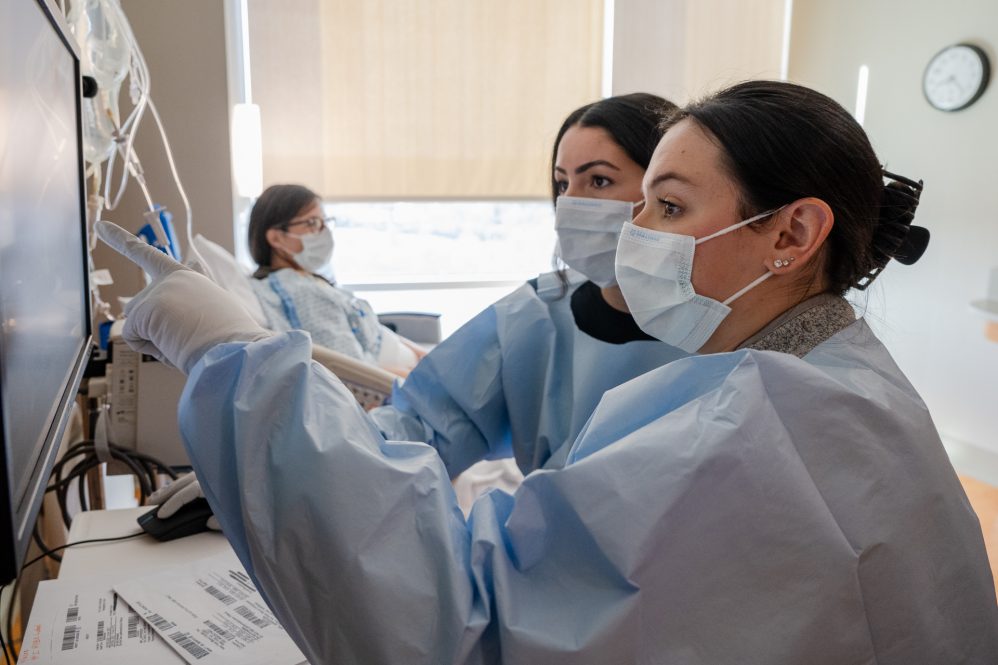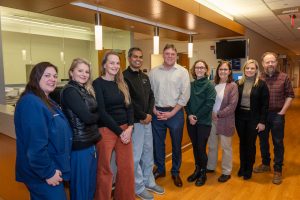
UConn Health’s Carole and Ray Neag Comprehensive Cancer Center is now offering blood and marrow transplants to patients in need. UConn Health’s Blood and Marrow Transplant Program has launched thanks to the recruitment of expert Dr. Kapil S. Meleveedu, assistant professor of medicine and director of Blood and Marrow Transplantation at UConn Health.
Meleveedu’s expertise, experience, and in-depth fellowship training from the Mayo Clinic in blood and marrow transplantation and UConn School of Medicine fellowship training in Hematology and Oncology, is making the new BMT program possible. He completed his residency training at Yale-Bridgeport Hospital program in internal medicine after graduating from India’s Calicut Medical College with a focus in medicine and surgery.
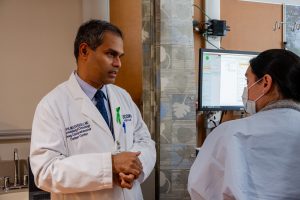
“This new Blood and Marrow Transplant Program will help meet the growing needs of the citizens of our state, especially in the central Connecticut area,” says Meleveedu. “Our new dedicated Bone Marrow Transplant Unit and its skilled transplant team consisting of hematologists and oncologists, advanced practice providers, nurses, clinical and quality coordinators will also safeguard the needs of our immunosuppressed blood cancer patients as they undergo the complex and lifesaving bone marrow transplants.”
The state-of-the-art Bone Marrow Transplant Unit, part of the Neag Comprehensive Cancer Center, is located inside UConn John Dempsey Hospital. The unit has five dedicated, high-tech, specialized airflow private patient rooms and an isolation room for transplantation care and monitoring of patients.
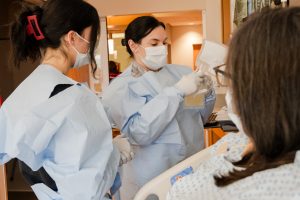
Under Meleveedu’s leadership the unit’s specialized hematologists-oncologists and skilled oncology nurses are providing patients comprehensive care including access to necessary special labs and tests and psychosocial, palliative, dietary, physical therapy support resources.
“Our Blood and Marrow Transplant program at UConn Health is a huge team effort meeting each patient’s individual needs. Also, it is extremely important for blood cancer patients to be treated near their family and home, which is why UConn Health is committed to taking care of these patients in our community,” says Meleveedu.
The Blood and Marrow Transplant program is initially caring for blood cancer patients in need of life-saving autologous transplants using the power of their own blood stem cells. Following accreditation, the program will expand to offer allo-transplants, where donated blood stem cells are transplanted from a family member or unrelated donor that is a close genetic match. Meleveedu also looks forward to bringing CAR-T Cell Therapy to UConn Health patients in the near future which helps boost a patient’s own immune cells to find and fight their blood cancer.
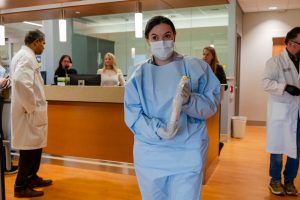
The auto-transplant process works by using a medication for five days to dramatically boost a patient’s production of their own circulating hematopoietic progenitor cells or blood stem cells in their blood stream. Subsequently, an apheresis machine (akin to a dialysis machine) is used to collect millions of these circulating blood stem cells that must be frozen and available to transplant back into the patient via simple intravenous infusion.
Then, during several days prior to the autologous transplant, a patient receives a very high dose of chemotherapy to destroy their cancer. As an unavoidable side effect, along with the cancer, normal bone marrow cells are also destroyed. Then the patient’s own transplanted cells are used to replace their destroyed bone marrow cells refreshing their immune system, reducing their chance of cancer relapse, and increasing their overall survival. This has been successfully used in many blood cancers including multiple myeloma and lymphoma.
